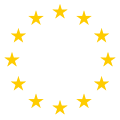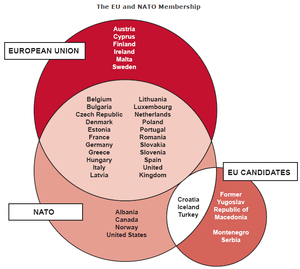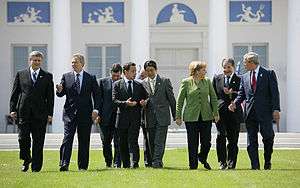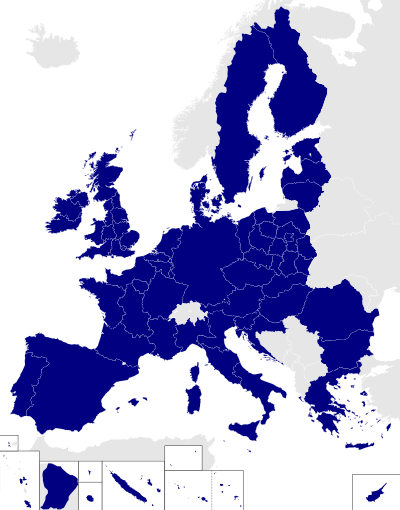Common Foreign and Security Policy
- This article deals with the workings of European Union foreign policy. For the relations between the European Union and third countries, see Foreign relations of the European Union.
| European Union |
 This article is part of a series on the |
Policies and issues
|
The Common Foreign and Security Policy (CFSP) is the organised, agreed foreign policy of the European Union (EU) for mainly security and defence diplomacy and actions. CFSP deals only with a specific part of the EU's external relations, which domains include mainly Trade and Commercial Policy and other areas such as funding to third countries, etc. Decisions require unanimity among member states in the Council of the European Union, but once agreed, certain aspects can be further decided by qualified majority voting. Foreign policy is chaired and represented by the EU's High Representative, currently Federica Mogherini.
The CFSP sees the North Atlantic Treaty Organisation (NATO) as responsible for the territorial defence of Europe and reconciliation. However, since 1999, the European Union is responsible for implementing missions such as peacekeeping and policing of treaties. A phrase often used to describe the relationship between the EU forces and NATO is "separable, but not separate".[1] The same forces and capabilities form the basis of both EU and NATO efforts, but portions can be allocated to the European Union if necessary.
History
| Common Foreign and Security Policy | |
|---|---|
| Pillar of the European Union | |

 | |
| The three pillars constituting the European Union (clickable) | |
|
|
1957–1993
Co-operation in international trade negotiations, under the Common Commercial Policy, dates back to the establishment of the community in 1957.[2] The CFSP itself has its origins in the formation of European Political Co-operation (EPC) in 1970.[3] European Political Co-operation was an informal consultation process between member states on foreign policy matters, with the aim of creating a common approach to foreign policy issues and promoting both the EC's own interests and those of the international community as a whole. This includes promoting international co-operation, respect for human rights, democracy, and the rule of law.[4]
1993–2009: pillar system
The weaknesses evident in EPC, apparent, for example during the Yugoslav wars, led to a desire to strengthen foreign policy. That was consolidated in the Maastricht Treaty, which entered into force in 1993 and established the European Union. While the previously existing supranational European Economic Community became one of three pillars, two more pillars were erected. The second CFSP-pillar was based on intergovernmentalism, which meant unanimity between members in the Council of Ministers and little influence by the other institutions.
The Amsterdam Treaty created the office of the High Representative for the Common Foreign and Security Policy (held by Javier Solana until 1 December 2009) to co-ordinate and represent the EU's foreign policy.[5]
2009–present: Consolidation
The Treaty of Lisbon took effect in December 2009 and brought an end to the pillar system. The CFSP's status of being a "pillar" thus ended. Furthermore, in an effort to ensure greater co-ordination and consistency in EU foreign policy, the Treaty of Lisbon created a High Representative of the Union for Foreign Affairs and Security Policy, de facto merging the post of High Representative for the Common Foreign and Security Policy and European Commissioner for External Relations and European Neighbourhood Policy. Since December 2011 the High Representative (HR) is in charge of the European External Action Service (EEAS), which was also created by the Treaty of Lisbon. It essentially is intended to be a common Foreign Office or Diplomatic Corps for the European Union.
Objectives
According to Article J.1 of title V of the Maastricht Treaty, the European Union defines and implements a common foreign and security policy that covers all areas of foreign and security policy, the objectives of which are to:
- Safeguard the common values, fundamental interests, independence and integrity of the Union in conformity with the principles of the United Nations Charter;
- Strengthen the security of the Union in all ways;
- Preserve peace and strengthen international security, in accordance with the principles of the United Nations Charter, as well as the principles of the Helsinki Final Act and the objectives of the Paris Charter, including those on external borders;
- Promote international co-operation;
- Develop and consolidate democracy and the rule of law, and respect for human rights and fundamental freedoms.
Elements
Types of policy
The European Council defines the principles and general guidelines for the CFSP as well as common strategies to be implemented by the EU. On the basis of those guidelines the Council of Ministers adopts joint actions or common positions. Joint actions address specific situations where operation action by the EU is considered necessary and lay down the objectives, scope and means to be made available to the EU. They commit the member states. Common positions on the other hand, define the approach that the EU takes on a certain matter of geographical or thematic nature, and define in the abstract the general guidelines to which the national policies of Member states must conform.
High Representative
The High Representative, in conjunction with the President of the European Council, speaks on behalf of the EU in agreed foreign policy matters and can have the task of articulating ambiguous policy positions created by disagreements among member states. The Common Foreign and Security Policy requires unanimity among the now 28 member states on the appropriate policy to follow on any particular policy. Disagreements in CFSP, such as those that occurred over the war in Iraq,[6] are not uncommon.
The High Representative also coordinates the work of the European Union Special Representatives. With the Lisbon Treaty taking effect, the position became distinct from the Secretary-General of the Council of Ministers. The High Representative serves as the head of the European Defence Agency and exercises the same functions over the Common Security and Defence Policy as the CFSP. On 1 December 2009, Catherine Ashton took over Javier Solana's post as the High Representative, who has held the post since 1999. On 30 August 2014 it was announced by Herman Van Rompuy that Federica Mogherini would be the new High Representative, effective on November 1, 2014.
Bodies
There are a number of bodies set up within the context of the CFSP. Within the Council, there is the Foreign Affairs Council (FAC) configuration, essentially a meeting of foreign ministers and the Political and Security Committee or PSC, which monitors the international situation in the areas covered by the CFSP and contributes by delivering opinions to the Council of Ministers, either at its request or its own initiative, and also monitors the implementation of agreed policies.
The European Defence Agency (EDA) encourages increase in defence capabilities, military research and the establishment of a European internal market for military technology. Two bodies carried over from the Western European Union (see defence, below) are the European Union Institute for Security Studies (EUISS) and the European Union Satellite Centre (EUSC). The EUISS is the European Union's in-house think tank. Its mission is to find a common security culture for the EU, to help develop and project the CFSP, and to enrich Europe's strategic debate. The EUSC is providing analysis of satellite imagery and collateral data.
Defence policy

Since the Cologne European Council in 1999, the Common Security and Defence Policy (or CSDP) has become a significant part of the CFSP. The EU itself has limited military capability, member states are responsible for their own territorial defence and a majority of EU members are also members of NATO, which is responsible for the defence of Europe.
There was also the Western European Union (WEU), which was a European security organisation related to the EU. In 1992, the WEU's relationship with the EU was defined, when the EU assigned it the "Petersberg tasks" (humanitarian missions such as peacekeeping and crisis management). These tasks were later transferred from the WEU to the EU by the Amsterdam Treaty; they formed part of the new CFSP and the Common Security and Defence Policy. Elements of the WEU were merged into the EU's CFSP and the President of the WEU was also the High Representative.[7][8] In 2010 the merger led to the final dissolution of the WEU (30 June 2011).
Following the Kosovo war in 1999, the European Council agreed that "the Union must have the capacity for autonomous action, backed by credible military forces, the means to decide to use them, and the readiness to do so, in order to respond to international crises without prejudice to actions by NATO." To that end, a number of efforts were made to increase the EU's military capability, notably the Helsinki Headline Goal process. After much discussion, the most concrete result was the EU Battlegroups initiative, each of which is planned to be able to deploy about 1500 men quickly.[9] EU forces have been deployed on peacekeeping missions from Africa to the Balkans and the middle east.[10] EU military operations are supported by a number of bodies, including the European Defence Agency, satellite centre and the military staff.[11]
Political and Security Committee
The Political and Security Committee (PSC or "COPS" from its French acronym) first established as an interim body in 2000 is described by the Nice European Council Conclusions as the "linchpin" of the European Security and Defence Policy and the Common Foreign and Security Policy. Its responsibilities include the drafting of opinions for the Foreign Affairs Council, which is one of the configurations of the Council of the European Union, and exercising "political control and strategic direction" of EU crisis-management operations. The committee is a standing body and is composed of national representatives of "senior / ambassadorial level" and meets at least twice a week (Tuesdays and Fridays) in Brussels. It is chaired by the European External Action Service.
Stopping humanitarian atrocities
EU foreign policy is committed to the protection of human rights. Research suggests that rhetoric along these lines from EU decision-makers is consistent with actual EU foreign policy activity.[12] Military and economic interventions by the EU are consistently more likely in countries where violence explicitly targets civilians.[12] Geostrategic concerns also influence EU action, as the EU has been "most attentive to human rights violations in non-EU European states, followed by countries in sub-Saharan Africa, while it has been least active in Asia and the Americas".[12]
Counterterrorism policy
The European Union considers to be terrorist organisations those groups or those entities that are controlled directly or indirectly by persons who commit or attempt to commit terrorist acts, participating in these groups, or facilitating the execution of terrorist plans. It also includes defining those groups and entities acting on behalf or under the direction of such persons, groups and entities, including funds derived or generated from property owned or controlled directly or indirectly by such persons or by associated persons, groups and entities. The watch list was reviewed for the Law Library of Congress in 2007.[13]
The European Union gives a definition of terrorism as Common Position 2001/931/CFSP of 27 December 2001,[14] also referred to by successive acts. It highlights them as intentional acts which, given their nature or context as defined crimes under domestic law, may seriously harm a State or an international organization when committed for the purpose of:
- seriously intimidating a population
- unduly compelling a Government or international organization to perform or abstain from performing any act
- seriously destabilizing or destroying the fundamental political, constitutional, economic or social constructs
List of terrorist organisations
The list of terrorist organisations was started in 2001 with the 13 organisations listed on 27 December of Common Position 2001/931/CFSP.[14] The European Community had not listed Al-Qaeda although the 9/11 attacks had been the instigator of the list. It has been updated by a number of subsequent declarations, such as Common Position 2006/231/CFSP of 21 December 2005;[15] for example so as to include LTTE.[16]
Common Position 2005/847/CFSP of the European Council of 29 November 2005 updated the list of these organizations,[17] which are as follows:
- Abu Nidal
- Al-Aqsa Martyrs' Brigades
- Al-Aqsa eV
- Al-Takfir wa-l-Hijra
- Aum Shinrikyo
- Babbar Khalsa
- Communist Party of the Philippines, including the New People's Army
- Continuity Irish Republican Army (CIRA)
- ETA / Bath Tierra y Libertad / Basque Fatherland and Freedom (ETA), which includes organizations: KAS, Xaki, Ekin, Jarrai-Haika-Segi and Gestoras pro Amnistía
- Al-Jama'a al-Islamiyya
- Islamic Front of the great fighters of the East
- Grupos de Resistencia Anti-Fascist Primero de Octubre / October 1, anti-fascist resistance group (GRAPO)
- Hamas, including 'Izz Brigades al-Din al-Qassam
- Hizbul Mujahideen
- Holy Land Foundation for Relief and Development
- International Sikh Youth Federation
- International Solidarity
- Kahane Chai
- Kurdistan Workers' Party (PKK)
- Loyalist Volunteer Force (LVF)
- Mujahedin-e Khalq (MKO or MEC), except for the National Council of Resistance of Iran (NCRI)
- National Liberation Army / Ejército de Liberación Nacional (ELN)
- Orange Volunteers (OV)
- Front for the Liberation of Palestine
- Islamic Jihad Movement in Palestine, also known as the Palestinian Islamic Jihad (PIJ)
- Popular Front for the Liberation of Palestine - General Command (PFLP-GC)
- Real IRA
- Red Brigades for the Construction of the Communist Party Fighter (BR-PCC)
- Red Hand Defenders (RHD)
- Revolutionary Armed Forces of Colombia (FARC)
- Revolutionary Nuclei / Epanastatiki Pirines
- Revolutionary Organization November 17 / Dekati Evdomi Noemvri
- Devrimci Sol or Army / Front / Revolutionary People's Liberation Party (DHKP / C)
- Revolutionary Popular Struggle / Epanastatikos Laikos Agonas (ELA)
- Partido Comunista Peruano - Sendero Luminoso / Shining Path (SL)
- Stichting Al Aqsa Mosque (aka Stichting Al Aqsa Nederland, aka Al Aqsa Nederland)
- Brigade XX Luglio
- Ulster Defence Association / Ulster Freedom Fighters (UDA / UFF)
- United Self-Defense of Colombia (AUC)
- Core initiative proletarian revolutionary (results Inactive)
- Informal Anarchist Federation including cell cooperative artisan fire, natural - occasionally spectacular
Outside the CFSP

Besides its own foreign and security policy, the Commission is also gaining greater representation in international bodies. Representation in international bodies is previously through the European Commissioner for External Relations, who worked alongside the High Representative, but now with the High Representative directly as a Commission Vice-President. In the UN the EU has gained influence in areas such as aid due to its large contributions in that field (see below).[18] In the G8, the EU has the rights of membership besides that of chairing/hosting summit meetings. The EU is represented at the G8 by the presidents of the Commission and the Council.[19] In the World Trade Organisation (WTO), where all 28 member states are represented, the EU as a body is represented by Trade Commissioner.[20]
The influence of the EU is also felt through the enlargement. The potential benefits of becoming a member of the EU act as an incentive for both political and economic reform in states wishing to fulfil the EU's accession criteria, and are considered a major factor contributing to the reform and stabilisation of former Communist countries in Eastern Europe.[21] This influence on the internal affairs of other countries is generally referred to as "soft power", as opposed to military "hard power".[22] An example of the support the European Union offers to the reform processes of its neighbours is EUBAM, the European Union Border Assistance Mission to Moldova and Ukraine, which assists the governments of Moldova and Ukraine in approximating their border and customs procedures to EU standards.
The European Union's influential economic status and its nation-like characteristics has been acknowledged by the United States' Central Intelligence Agency (CIA) in their publication The World Factbook. The EU was included in the Factbook in December 2004.[23]
Humanitarian aid
The European Community humanitarian aid office, or "ECHO", provides humanitarian aid from the EU to developing countries. In 2006 its budget amounted to 671 million euro, 48% of which went to the ACP countries.[24] Counting the EU's own contributions and those of its member states together, the EU is the largest aid donor in the world.[25]
The EU's aid has previously been criticised by the think-tank Open Europe for being inefficient, mis-targeted and linked to economic objectives.[26] Furthermore, some charities have claimed European governments have inflated the amount they have spent on aid by incorrectly including money spent on debt relief, foreign students, and refugees. Under the de-inflated figures, the EU did not reach its internal aid target in 2006[27] and the EU would not reach the international target of 0.7% of GNP until 2015. However, only a few countries have reached that target. In 2005 EU aid was 0.34% of the GNP, which was higher than that of the United States and Japan.[28] The ex commissioner for aid, Louis Michel, has called for aid to be delivered more rapidly, to greater effect, and on humanitarian principles.[25]
Neutrality
Although the Irish people were reassured of their neutrality before agreeing to the Nice Treaty, the Finnish Prime Minister, Matti Vanhanen, on 5 July 2006, while speaking to the European Parliament as Council President declared:[29]
| “ | Mr Pflüger described Finland as neutral. I must correct him on that: Finland is a member of the EU. We were at one time a politically neutral country, during the time of the Iron Curtain. Now we are a member of the Union, part of this community of values, which has a common policy and, moreover, a common foreign policy. | ” |
Nevertheless, a similar guarantee on neutrality in relation to the Treaty of Lisbon was granted to Ireland at the European Council of 18/19 June 2009:
The European Council also agreed that other concerns of the Irish people, as presented by the Taoiseach, relating to taxation policy, the right to life, education and the family, and Ireland's traditional policy of military neutrality, would be addressed to the mutual satisfaction of Ireland and the other Member States, by way of the necessary legal guarantees.[30]
See also
References
- ↑ . Cdi.org https://web.archive.org/web/20120309144841/http://www.cdi.org/mrp/eu.cfm. Archived from the original on 9 March 2012. Retrieved 2012-09-20. Missing or empty
|title=(help) - ↑ "Qualified-Majority Voting: Common commercial policy". The European commission. Retrieved 2007-09-03.
- ↑ "European political co-operation (EPC)". Europa Glossary. The European commission. Retrieved 2007-09-03.
- ↑ By Article 11 of the Maastricht Treaty.
- ↑ "Common Foreign and Security Policy (CFSP) – Overview". European Commission. 2002. Retrieved 2007-06-26.
- ↑ "Divided EU agrees Iraq statement". Europa (web portal). 27 January 2003. Retrieved 2007-06-26.
- ↑ "EU Security Police & the role of the European Commission". European Commission. Retrieved 2007-06-26.
- ↑ "EU Security Police & the role of the European Commission: Chronology". European Commission. Archived from the original on 22 October 2007. Retrieved 2007-06-26.
- ↑ "Military Capabilities". Council of the European Union. Retrieved 2007-10-09.
- ↑ "EU Operations". Council of the European Union. Retrieved 2007-06-26.
- ↑ "ESPD Structures". Council of the European Union. Retrieved 2007-06-26.
- 1 2 3 Kreutz, Joakim (2015-01-01). "Human Rights, Geostrategy, and EU Foreign Policy, 1989–2008". International Organization. 69 (01): 195–217. doi:10.1017/S0020818314000368. ISSN 1531-5088.
- ↑ loc.gov: "EUROPEAN UNION: LISTS OF TERRORIST PERSONS OR ORGANIZATIONS" Directorate of Legal Research LL File No. 2007-03957, June 2007
- 1 2 COUNCIL COMMON POSITION of 27 December 2001 on the application of specific measures to combat terrorism
- ↑ europa.eu: "Declaration by the EU Presidency on the application of specific measures to combat terrorism" (Brussels: 31 March 2006)
- ↑ statewatch.org: "Combating terrorism – Restrictive measures against certain persons and entities" Brussels, 31 May 2006 9974/06 (Presse 165)
- ↑ COUNCIL COMMON POSITION 2005/847/CFSP of 29 November 2005 updating Common Position 2001/931/CFSP on the application of specific measures to combat terrorism and repealing Common Position 2005/725/CFSP]
- ↑ "EU heading for single UN seat, UN official says". EU Observer. 2007. Retrieved 2007-06-26.
- ↑ "EU and the G8". European Commission delegation to Japan. Archived from the original on 26 February 2007. Retrieved 2007-09-26.
- ↑ "European Commission – External Trade – Trade Issues". European Commission. Retrieved 2007-06-26.
- ↑ "EU enlargement – voices from the debate". British Foreign and Commonwealth Office. Retrieved 2007-06-27.
- ↑ Bildt, Carl (2005). "Europe must keep its 'soft power'". Financial Times on Centre for European Reform. Retrieved 2007-06-26.
- ↑ Directorate of Intelligence (16 December 2004). "CIA – The World Factbook 2004: What's new (mirror)". Retrieved 2007-02-14.
- ↑ "DG for humanitarian aid – ECHO, financial report 2006" (PDF). European Commission. 2006. Retrieved 2007-08-13.
- 1 2 "Commission calls for a European consensus to boost impact of humanitarian aid". European Commission. 13 June 2007. Retrieved 2007-08-13.
- ↑ Mulvey, Stephen (30 May 2007). "EU attacked for 'inefficient' aid". BBC News. Retrieved 2007-08-13.
- ↑ Taylor, Jerome (11 May 2007). "EU accused of artificially inflating its aid figures". London: The Independent. Retrieved 2007-08-13.
- ↑ "Overviews of the European Union activities: Development". European Commission. Retrieved 2007-08-13.
- ↑ European Parliament Debate (English Translation) europarl.europa.eu
- ↑ "Conclusions, Brussels, 18/19 June 2009" (PDF). Presidency.
Further reading
- Dieter Mahncke (ed.), Peter Lang, European foreign policy – from rhetoric to reality ?, 2004, ISBN 90-5201-247-4.
- S. Kekeleire, J. MacNaughtan, The Foreign Policy of the European Union. Basingstoke: Palgrave Macmillan, 2008, ISBN 978-1-4039-4722-2.
- J. bie, Europe's Global Role: External Policies of the European Union. Aldershot: Ashgate, 2008. ISBN 978-0-7546-7721-5.
- C. Hill, M. Smith (eds.), International Relations and the European Union. Oxford: Oxford University Press, 2005. ISBN 978-0-19-927348-5.
- C. Bretherton, J. Vogler, The European Union as a Global Actor. London: Routledge, 2006. ISBN 978-0-415-28245-1
- Guicherd, Catherine, L'investissement de l'UE dans la sécurité collective en Afrique centrale : un pari risqué. Paris, Institute d'Etudes de Sécurité de l'Union Européenne, 2012. Occasional Paper – 15 May 2012
- D Seah, "The CFSP as an aspect of conducting foreign relations by the United Kingdom: With special reference to the Treaty of Amity & Cooperation in Southeast Asia". International Review of Law 2015.
External links
- EU website - Foreign and Security Policy
- von Ondarza, Nicolai (2008). "EU Military Deployment – An Executive Prerogative" (PDF). Brussels: German Institute for International and Security Affairs (SWP), Berlin.
- European Parliament Resolution on progress in implementing the common foreign and security policy European Navigator
- European Union Institute for Security Studies
- Online Resource Guide to EU Foreign Policy
- Press releases archive, CFSP

